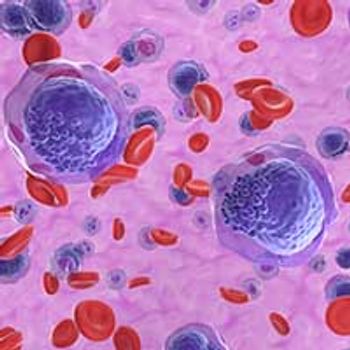
Chronic Lymphocytic Leukemia
Latest News

Latest Videos

CME Content
More News

Pirtobrutinib continued to showcase clinically meaningful efficacy in heavily pretreated patients with chronic lymphocytic leukemia or small lymphocytic lymphoma who had prior exposure to a covalent BTK inhibitor.

Zanubrutinib continued to demonstrate improved progression-free survival benefit over ibrutinib in the treatment of patients with relapsed/refractory chronic lymphocytic leukemia and small lymphocytic lymphoma, according to extended follow-up data from the phase 3 ALPINE trial.

The FDA has granted an accelerated approval to pirtobrutinib for the treatment of adult patients with chronic lymphocytic leukemia or small lymphocytic lymphoma who have received at least two prior lines of therapy, including a BTK inhibitor and a BCL2 inhibitor.

John N. Allan, MD, discusses the importance of understanding fixed-duration treatment approaches with BTK inhibitors and BCL2 inhibitors in patients with chronic lymphocytic leukemia, highlighting data within this treatment armamentarium.

Nicole Lamanna, MD, discusses how the use of novel agents could address resistance associated with current treatment options for patients with chronic lymphocytic leukemia.

John N. Allan, MD, discusses current data detailing the activity of venetoclax-based, fixed-duration regimens in the frontline setting for patients with chronic lymphocytic leukemia; the synergy and promising efficacy signals seen with BCL-2 and BTK inhibitor combinations; and ongoing research efforts exploring triplet regimens vs other continuous approaches in this space.

Nicole Lamanna, MD, discusses the challenges of resistance in patients with CLL, highlights treatment being developed for patients who progress on BTK inhibitor– or venetoclax-based regimens, and emphasizes the need for further enrollment onto clinical trials.

Bhagirathbhai Dholaria, MBBS, discusses limitations in the current CLL standards of care that necessitate more effective therapies; BTK inhibitors and degraders on the horizon for this population; and the potential future role of CAR T-cell therapy for patients with CLL.

The FDA has granted priority review to the supplemental biologics license application seeking approval to expand the indication of lisocabtagene maraleucel to include patients with chronic lymphocytic leukemia or small lymphocytic lymphoma who had prior exposure to a BTK inhibitor and a BCL-2 inhibitor.

Nicole Lamanna, MD, discusses treatment options for patients with chronic lymphocytic leukemia who develop resistance to a prior treatment.

Along with the combination of venetoclax and obinutuzumab, the BTK inhibitor–based regimens of zanubrutinib monotherapy and acalabrutinib plus obinutuzumab represent the preferred options in the National Comprehensive Cancer Network Guidelines for the first-line treatment of patients with chronic lymphocytic leukemia without 17p deletions or TP53 mutations.

The FDA has placed a partial clinical hold on the phase 1 NX-2127-001 trial investigating the novel BTK degrader NX-2127 in patients with relapsed/refractory B-cell malignancies.

Catherine C. Coombs, MD, discusses a real-world investigation of switching to a BCL-2 inhibitor-based regimen vs another covalent BTK inhibitor in patients with chronic lymphocytic leukemia/small lymphocytic leukemia who were intolerant to a prior covalent BTK inhibitor and highlighted factors to consider when deciding between these 2 approaches for this patient population.

Jennifer A. Woyach, MD, elucidates the updated results generated from a phase 2 study of venetoclax monotherapy in patients with relapsed/refractory chronic lymphocytic leukemia (CLL) whose disease progressed on a prior B-cell receptor inhibitor, expanded on key findings from a genomic analysis from the study, and highlighted what these findings could mean for the CLL treatment paradigm.

The United Kingdom’s National Institute for Health and Care Excellence has issued a final draft guidance recommending the approval of zanubrutinib for the treatment of adult patients with untreated, high-risk chronic lymphocytic leukemia harboring a 17p deletion or TP53 mutation.

The phase 3 BRUIN CLL-314 trial evaluating the selective noncovalent BTK inhibitor pirtobrutinib vs the potent covalent BTK inhibitor ibrutinib is currently enrolling patients with chronic lymphocytic leukemia and small lymphocytic lymphoma who previously received treatment with non-BTK inhibitor therapy.

John N. Allan, MD, discusses a planned evaluation of obinutuzumab triplet consolidation therapy for patients with chronic lymphocytic leukemia /small lymphocytic lymphoma who remain minimal residual disease–positive after initial treatment with zanubrutinib and venetoclax .

Adam Kittai, MD, discusses key findings from a matching-adjusted, indirect comparison of acalabrutinib with or without obinutuzumab vs zanubrutinib monotherapy in treatment-naïve chronic lymphocytic leukemia/small lymphocytic lymphoma.

Patients with treatment-naïve chronic lymphocytic leukemia/small lymphocytic leukemia without 17p deletions experienced superior efficacy following treatment with acalabrutinib plus obinutuzumab compared with zanubrutinib monotherapy.

Administration of acalabrutinib to patients with chronic lymphocytic leukemia with or without cardiovascular disorders at baseline results in a numerically decreased incidence of overall treatment-related cardiac toxicities and a comparable safety profile vs comparator CLL therapies such as ibrutinib.

Treatment with single-agent venetoclax led to prolonged disease response in patients with chronic lymphocytic leukemia who had relapsed or become refractory to prior B-cell receptor inhibitors including ibrutinib and idelalisib, according to findings from a phase 2 study.

The undetectable minimal residual disease ate achieved with bendamustine followed by obinutuzumab, acalabrutinib, and venetoclax increased as the regimen was continued as maintenance treatment in patients with relapsed or refractory chronic lymphocytic leukemia.

Treatment with subcutaneous epcoritamab-bysp elicited rapid and durable responses, including an encouraging complete response rate, and manageable safety in high-risk patients with relapsed/refractory chronic lymphocytic leukemia.

Patients with chronic lymphoctyic leukemia treated with pirtobrutinib monotherapy experienced comparable objective response rates regardless of acquired BTK mutation and a decrease or clearance of BTK cysteine 481 clones despite the emergence of non-C481 clones or other less common mutations during or near the time of progression.

Patients with relapsed/refractory chronic lymphocytic leukemia achieved sustained progression-free survival and overall survival benefit after treatment with fixed-duration venetoclax plus rituximab vs bendamustine plus rituximab, according to data from the phase 3 MURANO trial.











































